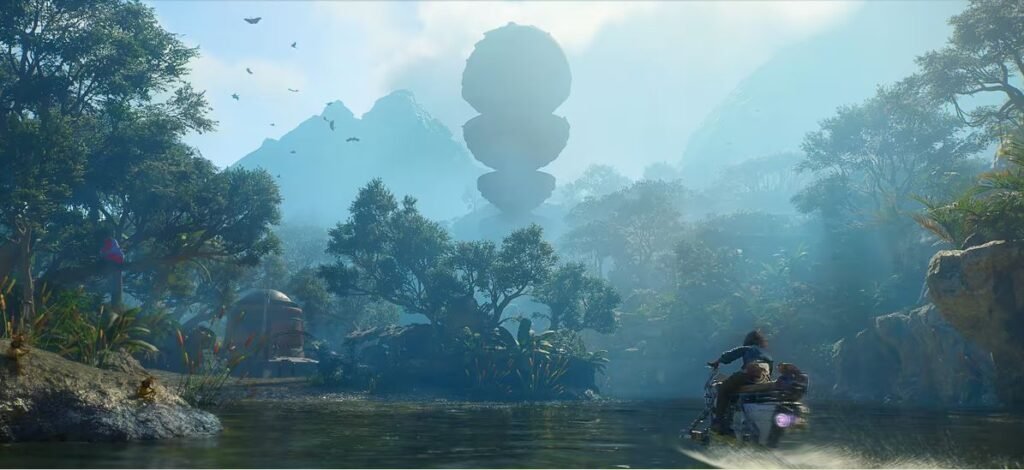Star Wars: Outlaws – A Fresh Frontier in Open-World Storytelling

Breaking the Ubisoft Mold with Reactive Gameplay and Dynamic Systems
For a decade, I’ve immersed myself in the ever-evolving world of video games, dissecting everything from sprawling RPGs to pulse-pounding shooters. Ubisoft, a titan in the industry, has consistently delivered massive open-world experiences, each with its unique flair. However, not all titles resonate equally with players. Recently, I embarked on an adventure with Massive Entertainment’s Star Wars: Outlaws, and it was a moment that reignited my passion for truly immersive gaming. In this review, I delve into what sets Outlaws apart, exploring its innovative systems, dynamic world, and the delicate balance it strikes between freedom and structure.
A Departure from the Usual Ubisoft Formula
Ubisoft is renowned for its expansive open-world games—titles like Assassin’s Creed and Far Cry have set high standards. Yet, these games often grapple with what many players describe as “open-world bloat.” Missions can feel like checkboxes to tick, and map icons frequently clutter the screen, detracting from the immersive experience. Star Wars: Outlaws breaks this mold, presenting a universe where every choice feels meaningful and the environment responds organically to the player’s actions.
An Organic, Self-Determined Flow
From the moment I started playing Outlaws, the difference was palpable. After an exhilarating dogfight in space and a spirited card game in a boozy cantina, I found myself exploring a creepy cave on a distant planet. In many Ubisoft games, such transitions can feel jarring, with map icons acting as mental weights. Outlaws, however, offers an organic flow. The reasons behind Kay Vess’s (the protagonist) decisions to leave one frozen wasteland for another planet’s depths felt natural and self-determined, rather than being driven by a checklist of objectives.
This seamless transition is a testament to Outlaws’ design philosophy. The game isn’t just a series of missions strung together; it’s a living, breathing world that reacts to your actions in real-time, creating a unique and personalized gaming experience.
Reactive Gameplay: A New Open-World Experience
One of the standout features of Outlaws is its reactive gameplay. This isn’t your typical open-world sandbox where players can aimlessly roam or follow predetermined paths. Instead, every decision you make has tangible consequences that shape the world around you. Whether it’s the missions you undertake, the factions you ally with, or the skills you develop, your choices influence the game’s narrative and environment in meaningful ways.

Faction System: Building or Breaking Alliances
At the heart of Outlaws’ dynamic world is its sophisticated faction system. Kay Vess, as a freelance outlaw, interacts with various criminal syndicates, each with its own agenda. This system allows players to either cultivate or destroy their reputation with these factions, significantly impacting the gameplay experience.
For instance, choosing to work with the Hutt syndicate by stealing documents can simultaneously undermine the Pyke syndicate’s schemes. Such decisions are not merely narrative choices but have practical implications. A higher reputation with a faction can unlock discounts, exclusive areas, and special rewards, while a lower reputation might restrict access and provoke hostile reactions from its members.
This nuanced system encourages players to think strategically about their alliances. The inter-faction dynamics ensure that no single path dominates the gameplay, fostering a rich tapestry of interactions that keep the experience fresh and engaging.
Unique Ability Upgrades: Beyond Traditional XP
Another innovative aspect of Outlaws is its approach to ability upgrades. Unlike traditional RPGs that rely on experience points (XP) to level up, Outlaws ties Kay’s abilities to the acquisition of specific rare gear and the completion of particular actions. For example, upgrading Kay’s silent takedown ability requires her to steal or purchase specific items within Pyke territory.
This system not only ties character progression to the game’s narrative but also encourages exploration and strategic planning. Players must engage with the world’s various elements to enhance their abilities, making each upgrade feel earned and directly tied to their unique playstyle.
A Personal Journey: Choices That Matter
During my playthrough, I faced a pivotal moment that highlighted Outlaws’ commitment to player agency. After completing a mission for the Hutt syndicate, my reputation with the Pykes suffered, restricting access to their territory on the jungle planet of Akiva. To undertake a new mission centered around acquiring a crucial item from the Pyke-controlled area, I had two choices: sneak in despite my low reputation or work to improve my standing with the Pykes.
Opting to mend my relationship with the Pykes led me to the underground caves of Toshara, where I engaged in missions that would bolster my reputation. This push-and-pull dynamic required me to travel to distant planets and select missions that aligned with my immediate goals, rather than following a preordained path. The result was a gameplay experience that felt genuinely tailored to my decisions, enhancing the sense of immersion and investment in the game’s world.
Streamlined Open World with Clear Trajectories
Star Wars: Outlaws strikes a delicate balance between open-ended exploration and clear, purpose-driven trajectories. Unlike many of Ubisoft’s other open-world titles, which can sometimes feel overwhelming due to their sheer size and multitude of activities, Outlaws offers a more focused and meaningful experience.
The game provides a clean, slick canvas that is rich with depth and variety, allowing player choice to dictate the flow of action. This approach eliminates the feeling of being lost in a vast, indifferent world and instead fosters a sense of purpose and direction, making each player’s journey unique.
Addressing Player Frustrations
Many players have expressed frustration with Ubisoft’s tendency to prioritize scale over substance, leading to bloated worlds that can feel monotonous and repetitive. Outlaws seems to directly address these concerns by offering a world that is not only expansive but also deeply responsive to player actions. The reactive systems ensure that the game remains engaging, with each decision carrying weight and consequence.
This responsiveness is particularly evident in how alignments shift and tasks change based on your actions. The game’s design speaks to players’ desires for more meaningful interactions and a more personalized gaming experience, moving away from the generic mission structures that can plague large open-world games.
Minor Flaws Amidst an Overall Joyful Experience
While Outlaws shines in many areas, it is not without its flaws. Some aspects of the stealth system feel underbaked, making it occasionally frustrating when trying to navigate silently through enemy territories. Additionally, certain missions can become repetitive over time, detracting from the otherwise dynamic experience.
However, these issues are relatively minor and are overshadowed by the game’s strengths. The overall experience remains one of constant joy, thanks to the ebb and flow of the innovative systems that allow for deep player engagement and strategic freedom.
Embracing the Chaos: Fun Amidst Jank
No game is perfect, and Outlaws is no exception. There are moments of jank and instability that can momentarily disrupt the immersion. However, these hiccups do little to dampen the overall excitement and enjoyment derived from the game’s systems and the freedom they afford.
As Kay Vess, players can manipulate the world in ways that feel both empowering and exhilarating. Whether it’s outsmarting rival syndicates, upgrading abilities through cunning strategies, or simply exploring the richly detailed Star Wars universe, Outlaws offers a playground ripe for creativity and adventure.
A Testament to Player Agency
Star Wars: Outlaws stands as a testament to the power of player agency in modern gaming. By prioritizing reactive systems and meaningful choices, Massive Entertainment has crafted a title that not only honors the rich lore of the Star Wars universe but also pushes the boundaries of open-world design.
The game’s ability to adapt to player actions creates a living, breathing world that feels genuinely responsive and engaging. This approach fosters a deeper connection between the player and the game, making each playthrough a unique and personal experience.
Conclusion: A Must-Play for Open-World Enthusiasts
After ten years of blogging about video games, I can confidently say that Star Wars: Outlaws is a standout title that successfully reinvents the open-world experience. Its innovative faction and ability systems, combined with a reactive and dynamic world, offer a refreshing departure from the often cumbersome and bloated landscapes typical of many Ubisoft games.
Despite minor flaws in the stealth mechanics and occasional mission repetition, the game excels in providing a rich, engaging, and personalized journey through the Star Wars galaxy. For fans of the franchise and open-world enthusiasts alike, Outlaws is a must-play that delivers both depth and freedom in equal measure.
In a landscape saturated with massive titles that sometimes prioritize scale over substance, Star Wars: Outlaws emerges as a beacon of thoughtful design and player-centric storytelling. It’s a game that not only meets but exceeds the expectations of what an open-world experience should be, making it a worthy addition to any gamer’s library.
